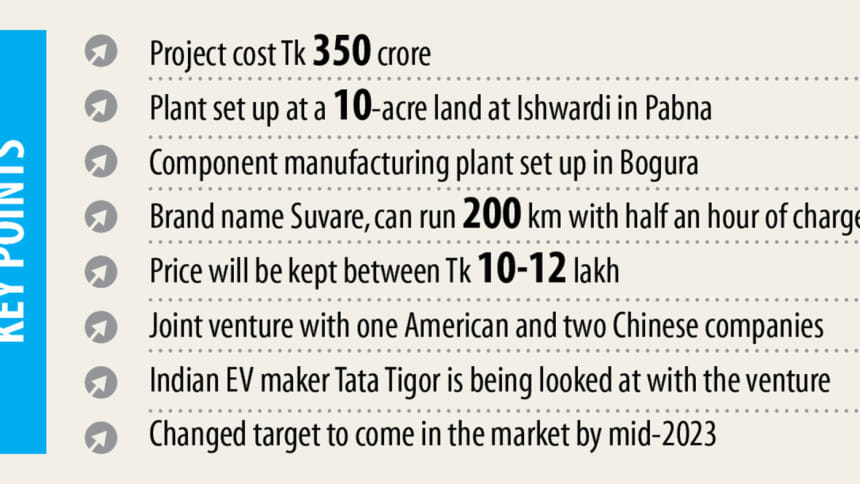Nitol’s electric car arrival pushed back by pandemic

Nitol Motors' plan to roll out locally assembled electric vehicles (EVs) has faced a setback as a fallout of the coronavirus pandemic, which is forcing the company to take two and a half years in additional time before making the cars available in Bangladesh.
Expectations of the arrival of EVs, which use rechargeable battery packs instead of fossil fuel for propulsion, by this year were heralded as yet another big stride for Bangladesh's fledgeling automotive industry.
"As per new target, we will bring the EV within next two and a half years," said Abdul Matlub Ahmad, chairman of Nitol-Niloy Group.

In the meantime, a huge amount of fund will be injected into the project, including from the US once its change in government takes place, bringing down prices of batteries and major components and reducing the price of the EVs thereby, he said.
"Only then we may expect EVs at affordable prices."
Further, due to the pandemic, no one is buying cars and people are moving less too.
"So, my personal feeling is that the EV, as a car, will come about at least after 2.5 years," he noted.
The construction of the assembly plant has already been completed on 10 acres of land in Pabna. It is now awaiting installation of capital machinery. Some of the components will also be manufactured in a Bogura plant of the group.
The assembly plant, having an estimated set-up cost of Tk 350 crore, will be able to annually churn out 20,000 EVs. Ahmad said a good amount of money had already been invested.
The group will start off with one model and initially assemble about 5,000 EVs annually.
To be called Suvare, the EV will have the size and feel of regular sedans and will cost about Tk 10 lakh to Tk 12 lakh, said Ahmad.
According to him, Suvare will be able to cover 200 kilometres with just half an hour of charging. In the near future, fast-charging stations are expected to be set up at refilling stations along the highway, allowing EVs to go longer distances.
The 25-kilowatt-hour battery with a life expectancy claimed to be of at least six years will take Tk 170 to completely charge each time as per the present power tariff structure.
It will be possible for the power to be topped up at homes using a fast-charging plug system.
"So, Suvare will be very cost-effective and environmentally friendly," Ahmad said.
The project is a partnership with one American and two Chinese companies and now Indian EV maker Tata Tigor is looking to join in, he said.
Nitol-Niloy Group has set up a research and development centre in the capital's Uttara, where designs for the vehicle and other components are being developed jointly with the mechanical department of the Dhaka University of Engineering & Technology (DUET).
The global market share of electric cars is on the rise: at the end of 2018, it stood at 4.6 per cent, almost double from what it was in 2017, according to the Centre of Automotive Management (CAM), a German research and consultancy institute.
China has the leading position in electric car use, followed by the US, Norway, Japan and the UK. By 2025, one-fourth of all new registrations will be of electric cars, according to the CAM.
In 2017, the car market size in Bangladesh was Tk 5,000 crore, according to industry insiders.
The EVs are being focused by the Ministry of Industries in an upcoming auto policy.
Under the policy, the government will look to make Bangladesh a hub for energy-efficient vehicles (EEVs) through strategic investments and adoption of advanced technology.
The aim is to go past the domestic market and penetrate regional and global markets by 2030.
The government is expected to introduce attractive tax exemptions on investments for the EEV assembly, even if the plants are set up outside of economic zones, and also introduce reductions in import duty or VAT under the new policy.
The policy is expected to pave the way for formal government recognition of electric three-wheelers and authorise their use of electricity to charge batteries. The present power tariff structure is based on domestic and commercial consumption.
There are 5 lakh to 10 lakh electric three-wheelers running around the country, mainly with permissions secured from local government authorities such as municipalities.

 For all latest news, follow The Daily Star's Google News channel.
For all latest news, follow The Daily Star's Google News channel. 



Comments